Overview:
To enhance their online presence, doctors should focus on building a professional website, leveraging SEO and online marketing strategies, and effectively managing their social media and online reputation. The article outlines a comprehensive approach that includes creating a user-friendly website, optimizing content for search engines, engaging with patients on social media, and managing reviews, all of which contribute to attracting and retaining patients in a digital landscape.
Introduction
In the digital age, a professional online presence is no longer optional for medical practices; it is a fundamental necessity. As patients increasingly turn to the internet for healthcare information and provider selection, establishing a well-designed medical website becomes crucial.
This article delves into the essential components of creating an effective medical website, optimizing it for search engines, and leveraging social media for patient engagement. Additionally, it explores the importance of managing online reputation through reviews and feedback, as well as the creation of valuable content that resonates with patients.
By implementing these strategies, healthcare professionals can enhance their visibility, build trust, and ultimately improve patient acquisition in a competitive landscape.
Building a Professional Medical Website: The Cornerstone of Online Presence
To create an online presence for doctors, start by selecting a reliable hosting provider and a user-friendly content management system (CMS), such as WordPress. The layout of your site should emphasize cleanliness, mobile adaptability, and user-friendly navigation, as an astounding 41% of individuals indicate that social media greatly affects their selection of healthcare providers. As Poulomi Chakraborty states, ‘Running a barber shop is more than just providing excellent haircuts,’ likewise, crafting a memorable digital experience is essential for drawing in and keeping clients.
Essential pages such as:
- ‘About Us’
- ‘Services’
- ‘Contact’
- ‘Patient Resources’
must be included to provide comprehensive information to your visitors. Moreover, incorporating features such as appointment scheduling and secure user portals improves experience and accessibility. Adherence to HIPAA regulations is essential; this entails protecting individual information and providing a transparent privacy policy.
Furthermore, utilizing video material can greatly enhance participant engagement; a significant 76% of individuals have viewed videos regarding health symptoms and treatments, suggesting a preference for video material. To sustain search engine visibility and keep your clients informed, it is essential to frequently refresh your website with new, pertinent information. As emphasized by recent findings, effective medical content marketing can result in a return on investment of at least 20%, underscoring the financial advantages of a well-structured online presence for doctors.
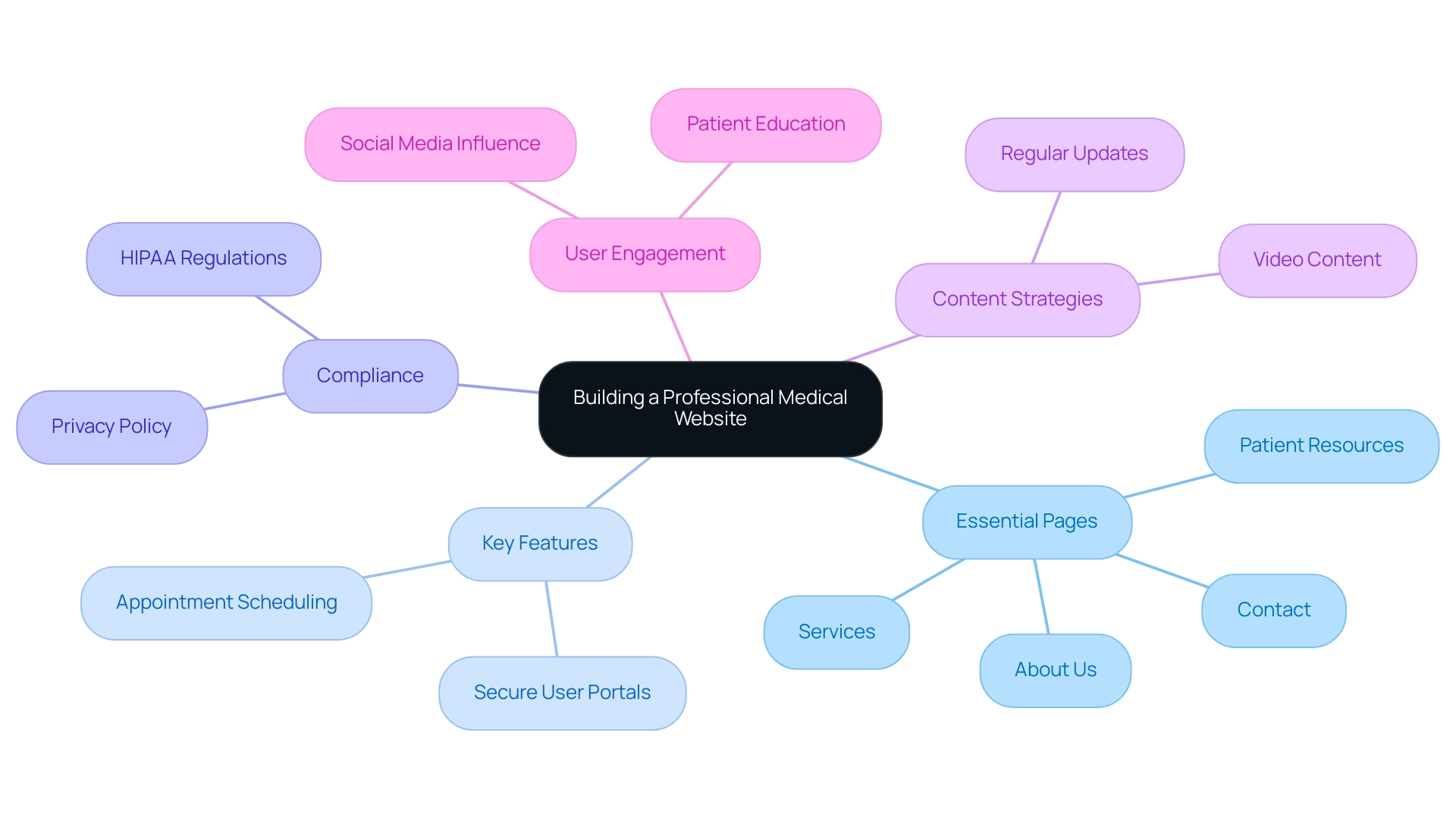
Leveraging SEO and Online Marketing to Boost Visibility
To effectively enhance your online presence for doctors, begin with thorough keyword research to uncover the terms potential clients are using when searching for healthcare services. This foundational step is crucial, as 70% of marketers assert that a doctor’s experience is a primary consideration for patients seeking healthcare. Once you have identified relevant keywords, optimize your website’s content—this includes titles, meta descriptions, and headers—by incorporating these terms strategically.
Furthermore, creating high-quality backlinks through partnerships with reputable health websites and directories will significantly bolster your site’s authority and visibility. Syndicating your content to other top health properties can also increase visibility for your profitable service lines, reaching a broader audience. Implementing Google My Business is essential for improving local search visibility, ensuring that your practice appears prominently in local search results.
Additionally, investing in pay-per-click (PPC) advertising allows you to target specific demographics effectively, driving targeted traffic to your website. Social media is another crucial platform, as 90% of Americans use it to find health information; leveraging this can improve your promotional strategy. Ultimately, it is essential to routinely examine website traffic and modify your promotional strategies based on performance metrics to guarantee ongoing success.
As emphasized by Audrey Keller, Senior Promotion Manager at Healthgrades,
Collaborate with Healthgrades to enhance conversion rates and transform your promotional goals into tangible outcomes.
Adopting these strategies will help establish an online presence for doctors, enhancing digital engagement and patient acquisition for your medical practice.
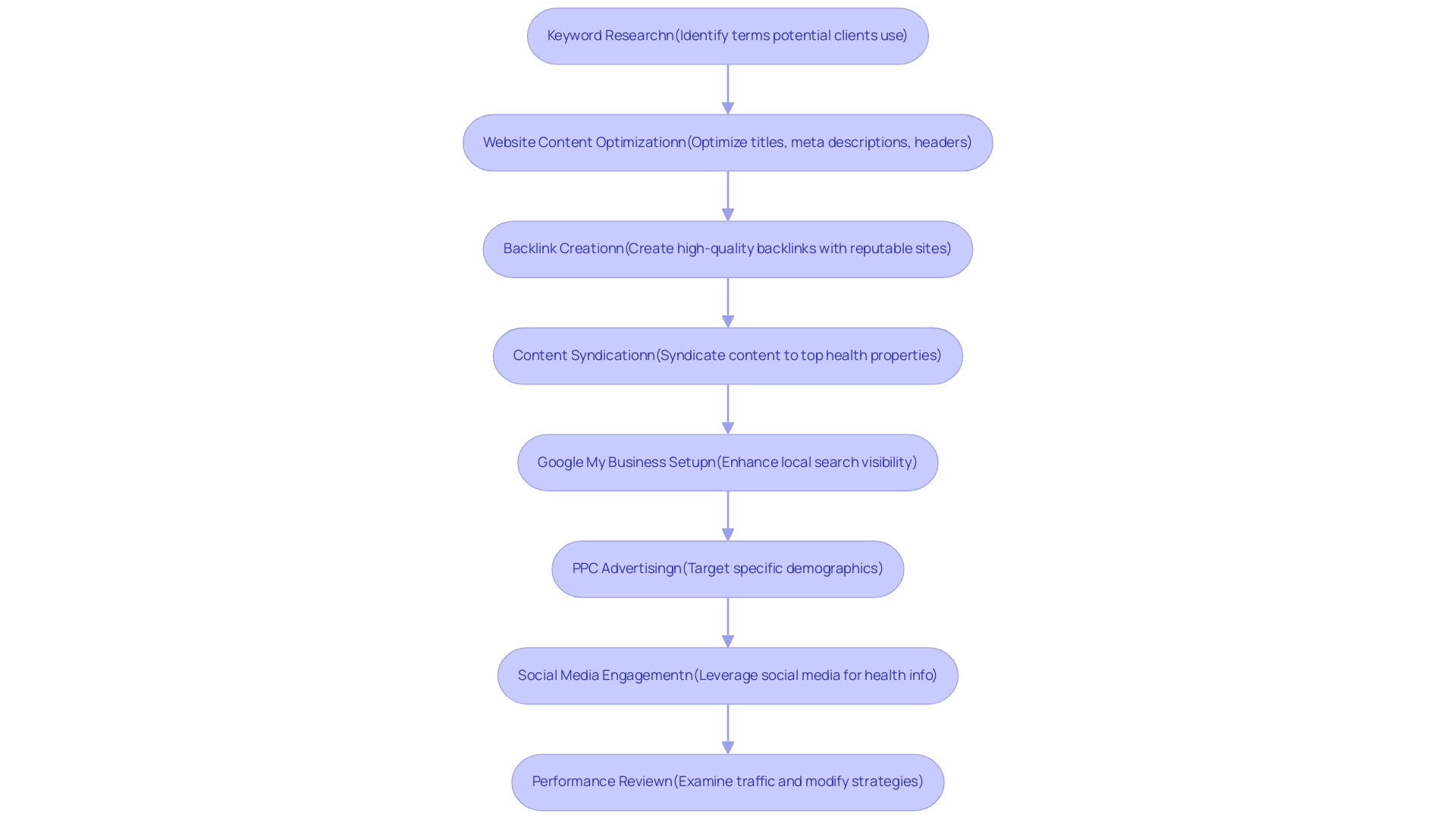
Harnessing Social Media for Patient Engagement and Brand Building
To optimize social media marketing efforts, healthcare professionals must select platforms that resonate with their target audience. Among these, Facebook stands out as the most used, with a recent survey indicating that over 1,500 hospitals nationwide prefer this platform for their digital presence. As noted by WHPRMS, “Of more than 1,500 hospitals nationwide that have an online presence for doctors, Facebook is most popular.”
This data underlines the necessity for hospitals to concentrate their social media strategies to improve their online presence for doctors where they can achieve maximum impact. Alongside Facebook, Instagram and LinkedIn have also shown significant potential, especially considering LinkedIn’s 28% growth in its healthcare user base over the past two years.
Creating a posting calendar is essential for organizing and timing consistent updates that provide valuable health information and testimonials from individuals. Engagement is key; promptly responding to comments and messages fosters a sense of community and trust. Furthermore, utilizing paid advertising on social media can broaden reach, enabling greater visibility among potential clients.
Monitoring engagement metrics is essential to understanding which material resonates with your audience. By analyzing these metrics, healthcare providers can refine their strategies accordingly. Hosting live Q&A sessions also presents an opportunity to connect with patients in real time, directly addressing their queries and concerns, thereby enhancing patient engagement and satisfaction.
As reports indicate that content promotion in medtech can yield at least a 20% return on investment, the significance of these strategies cannot be overstated. Additionally, monitoring changes to transaction code systems is essential to prevent delays in authorizations and payments, ensuring that social media marketing efforts are effective.
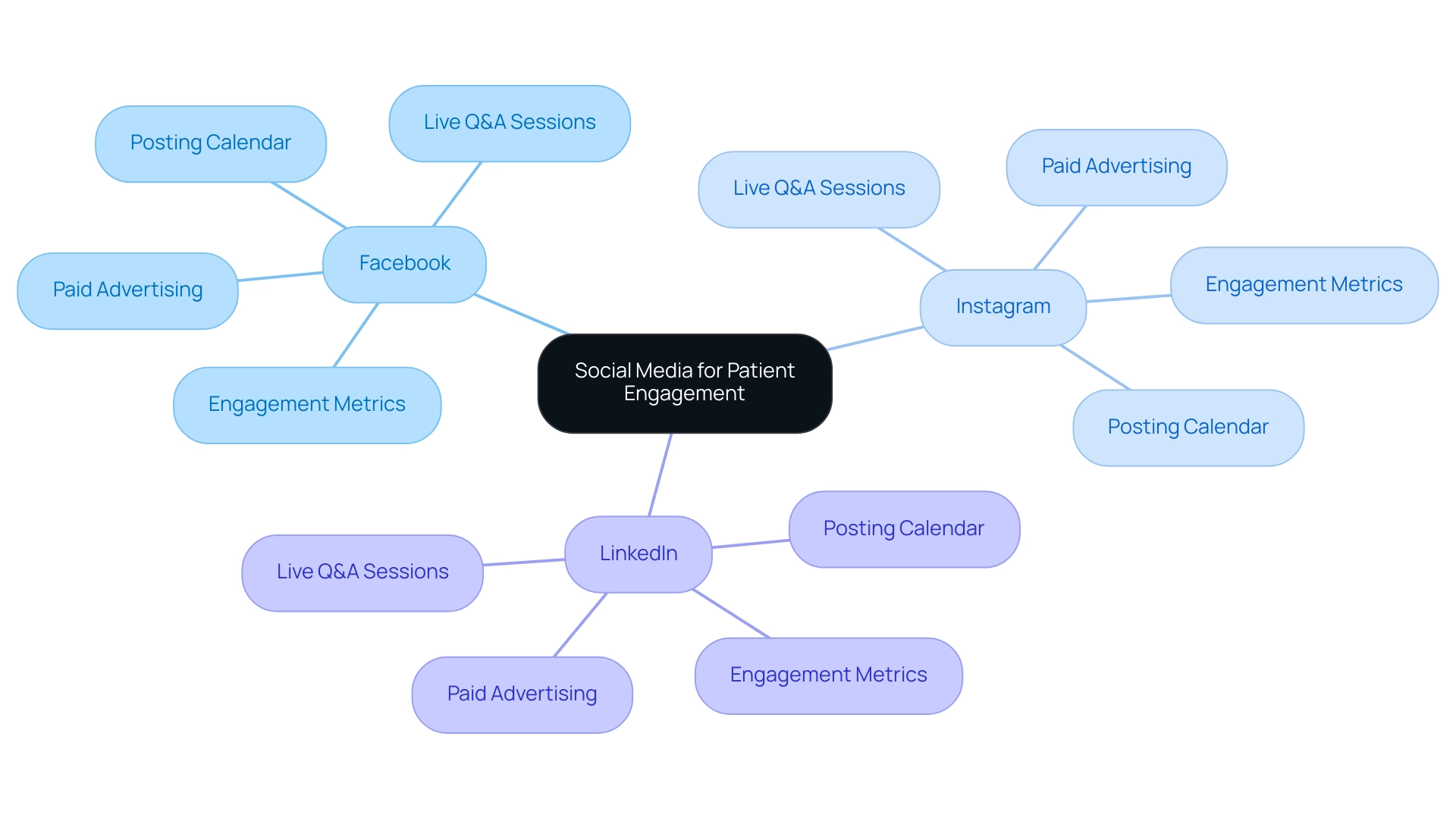
Managing Your Online Reputation: Importance of Reviews and Patient Feedback
Effectively managing your digital reputation is essential for the success of any medical practice. Start by consistently checking review platforms like Google, Yelp, and Healthgrades to remain aware of perceptions. Encouraging satisfied individuals to leave positive reviews can significantly boost your online presence; consider providing links to these platforms in follow-up emails or during consultations.
It is crucial to respond to all reviews promptly and professionally, irrespective of whether they are positive or negative. Constructively addressing negative feedback can transform potential setbacks into opportunities for improvement, as evidenced by the finding that 63% of dissatisfied reviewers are willing to update their reviews if their concerns are adequately resolved. This engagement not only showcases your dedication to client satisfaction but also strengthens trust among potential clients, as emphasized by the statistic that 58.08% of individuals consider referrals from medical professionals.
Additionally, utilizing client feedback is vital for identifying areas needing enhancement within your practice. Implementing a satisfaction survey can provide you with direct insights, allowing you to tailor your services to meet client expectations effectively. Considering recent trends in healthcare for 2024, including the fact that hospitals allocate 85% of their promotional budget to Google Ads despite a low click-through rate of 6.11%, these strategies will be instrumental in fostering a positive online reputation and enhancing patient engagement.
Furthermore, as AI continues to evolve, understanding its potential impact on marketing careers can help healthcare professionals enhance their engagement strategies, ensuring they remain competitive in a rapidly changing landscape.
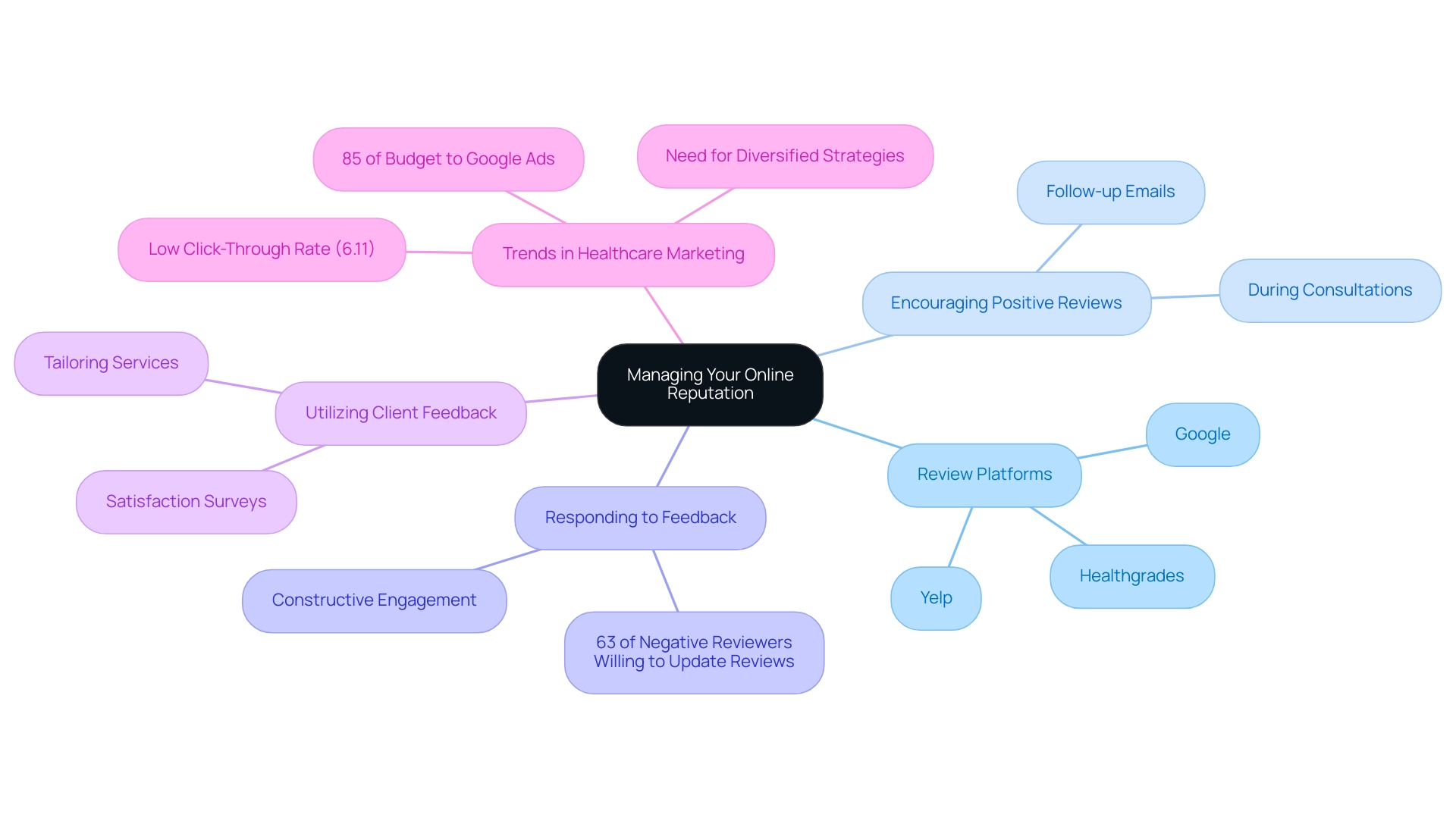
Creating Valuable Content: Engaging Patients and Establishing Authority
Creating a blog on your clinic’s website is a strategic method for improving the online presence for doctors by producing valuable information that addresses common health issues, treatment alternatives, and wellness advice. Given that 74% of U.S. adults utilize the Internet and 61% actively search for health-related information online, having an online presence for doctors that uses patient-friendly language and avoids medical jargon is crucial to ensure that your material remains accessible to all readers. Enhancing engagement through visual elements such as infographics and videos can significantly bolster the effectiveness of your articles.
To maximize your online presence for doctors, share your material across various social media platforms, thus engaging a broader audience. Additionally, creating downloadable resources, including e-books or informative pamphlets, provides individuals with more in-depth insights and promotes education. Consistently refreshing your material not only maintains its relevance but also enhances your website’s SEO performance, which is crucial for building an effective online presence for doctors and facilitating easier access for prospective clients to discover your services online.
As the healthcare environment keeps changing, aligning your promotional strategies with current trends, including establishing an online presence for doctors, will be essential for encouraging engagement and education among individuals. With 93% of healthcare marketers believing that AI will positively impact their organizations, integrating AI-driven insights into your content strategy can further enhance patient engagement. Moreover, as hospitals allocate a staggering 85% of their marketing budget to Google Ads, understanding and adapting to these marketing trends is essential for your clinic’s success.
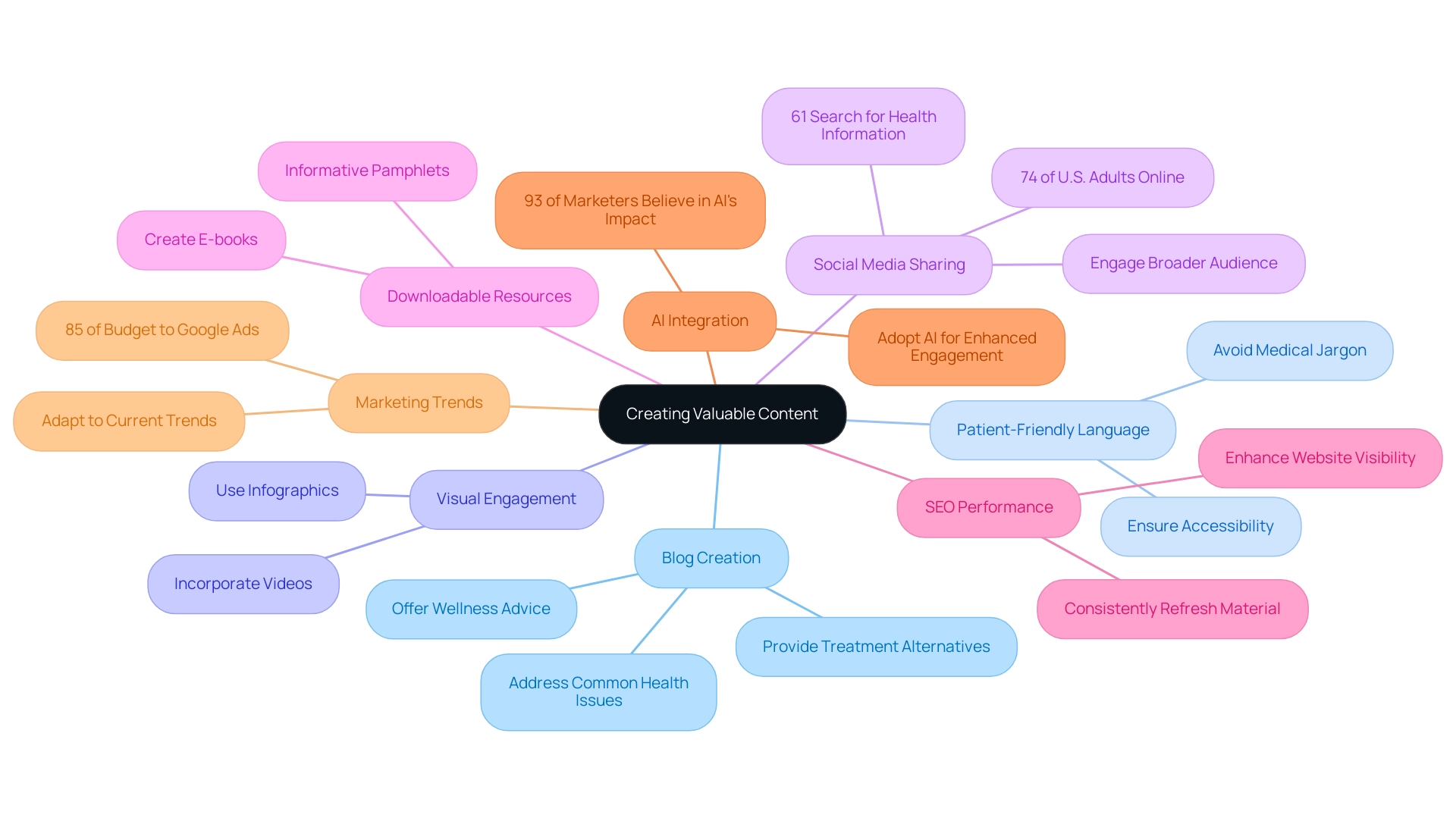
Conclusion
Establishing a professional online presence through a well-designed medical website is essential for healthcare practices in today’s digital landscape. By focusing on critical elements such as user-friendly design, relevant content, and compliance with regulations, medical professionals can create an engaging experience for patients. Incorporating features like online appointment scheduling and secure patient portals not only enhances accessibility but also builds trust with users.
Optimizing the website for search engines and leveraging online marketing strategies are vital for improving visibility. Conducting keyword research, creating high-quality backlinks, and utilizing local SEO tools like Google My Business are fundamental steps that can drive targeted traffic to the practice. Additionally, an active social media presence allows healthcare providers to engage with patients effectively, fostering community and trust through valuable content and timely responses.
Managing online reputation is equally important. Regularly monitoring reviews and responding professionally to feedback can significantly impact patient perceptions. Encouraging satisfied patients to share their experiences can enhance credibility and attract new clients. Furthermore, creating valuable content that resonates with patients not only establishes authority but also addresses their concerns, ultimately leading to higher engagement and satisfaction.
In conclusion, implementing these strategies is crucial for healthcare professionals aiming to thrive in a competitive environment. By prioritizing a comprehensive online presence, optimizing for search engines, engaging patients on social media, and managing reputation, medical practices can significantly enhance visibility, build trust, and improve patient acquisition. The digital age demands a proactive approach to online marketing, and those who embrace these practices will position themselves for long-term success.

